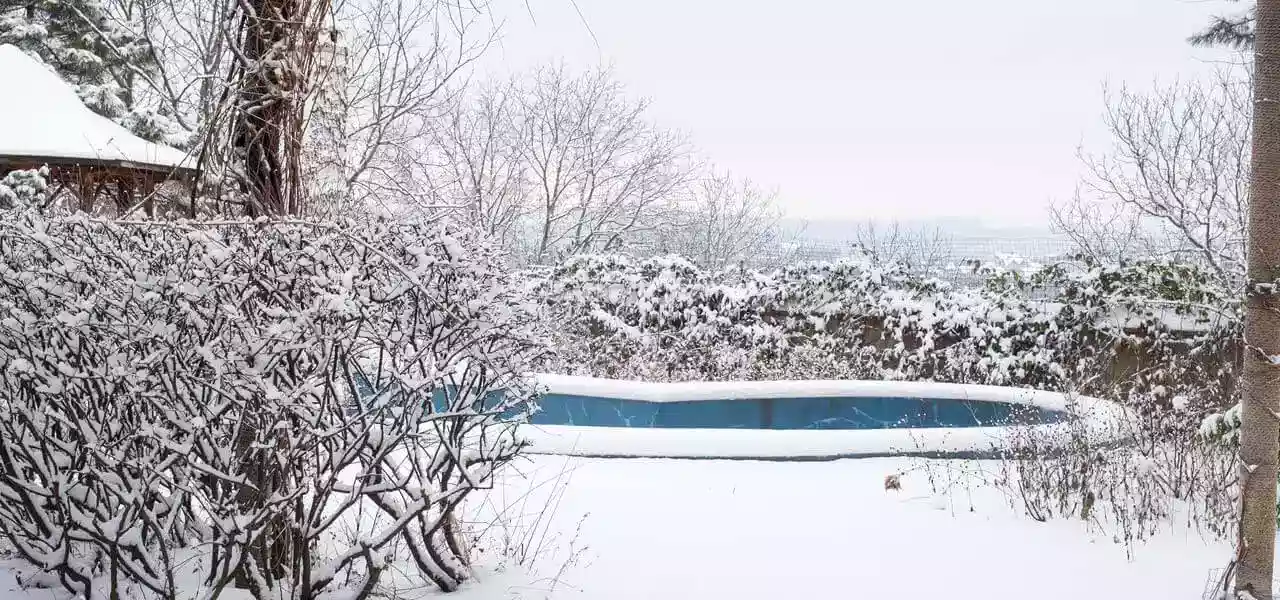FREE Standard Shipping On All Orders $100 or More!*

What Happens if I Don't Close My Pool for Winter?
If you closed your pool for the winter already, then we say congratulations...and sorry. Congrats for getting it done already, but sorry your summer is over! But if you haven't closed your pool yet, and you're still on the fence about doing so — this post is for you.
Closing your pool for winter is all about timing. If your local weatherman is already talking about upcoming cold fronts or frost warnings, you better get to it. We're going to show you what happens if you live in an area with freezing temperatures, and you don't close your pool for winter.
So buckle up and let's dive into the damages and disasters that can arise from leaving your pool open all winter!
What Happens if I Don't Close My Pool for Winter?
In short, it could fall apart. We know that sounds scary, but unfortunately, it's true. There are endless potential problems that can result from not closing your pool correctly, some of which are catastrophic. Let's get into the specifics.

1. Pipe Damage
Two of the most important steps for closing your pool for winter are lowering the water level to below the skimmer line, and ensuring that all water has been blown out of the pipes. Standing water left in the pipes and plumbing will freeze, and if you remember anything from your high school physics class, you know that water expands when it freezes. Frozen, expanding water will put tremendous pressure on equipment pipes, skimmers, and anything else full of water. Above ground pumps and pipes will freeze in less than an hour if temperatures are below freezing.
So again, one of the most important things to remember when closing your pool is to get all the water out of your pipes!
What About Underground Pipes?
Underground pipes do not freeze as quickly as above ground pipes due to the layer of protection from the ground. But that doesn't mean they won't freeze eventually. It takes several days of below freezing temperatures to freeze the ground and soil around the pipes.
2. Pump Damage
Pool pumps are expensive, that's a fact! So taking care of yours, especially when you close your pool for winter, is in your best interest. It's inexpensive and easy to replace frozen or broken PVC pipes and connectors, but it's a whole other story to replace the full pump. To safely winterize your pool pump, remove the two pipe plugs from the connection points.
3. Heater Damage
And don’t think your pool heater is any stronger! Cast iron and polymer heater headers are usually the first thing to snap in a sudden freeze. Which is not actually a bad thing, as this forces the heater to drain and prevents greater damage. Winterize your pool heater by removing the front and rear header drain plugs, and disconnect the pressure switch inside the heater. Blow out the heater lines to remove any water left over.

4. Filter Damage
Your pool filter tank can withstand enormous pressure, up to 50 psi in most cases, but that's still no match for the power of expanding ice. In some cases, the tank itself will crack, or the clamp ring on cartridge or DE filters will crack in half, or the top mounted multiport valve flange will separate from the tank, or just start leaking, as shown here.
To winterize a pool filter, open the air bleeder and remove the filter drain cap or drain plug. If you have a multiport valve, turn the handle to a spot between any two positions. And if you have a push-pull slide valve, place it mid-way between the up and down positions.
5. Deck Damage
Nothing will ruin your spring pool opening like discovering a pipe leak underneath your pool deck. Improper pool closing practices can cause a major headache in the form of a spring time pool deck gut-job. Fixing external, above ground pipes is not much of a challenge, but having to cut through thick concrete or stone deck to fix underground pipes is another story.

6. Pool Walls and Structure Damage
If you have an above ground pool, there’s something unique that can happen if you don’t properly close your pool for winter and use an air pillow or winterize the skimmer properly — they can crumple like tin cans. An above ground pool is designed to contain water inside, but as an ice sheet thickens across the pool, it puts outward stress on the walls. When the ice sheet is also frozen inside the skimmer - any heaving, tilting or slipping of the ice sheet can wreak havoc on even the strongest above ground pools.
Still Don't Want to Close Your Pool for Winter?
In The Swim carries the pool-saving Intermatic freeze sensor, which is compatible with the PE153 Digital Timeclock. This setup allows you to pre-set a temperature for the pump to turn on automatically, so you don't have to worry about it.
If you do close your pool for winter, don't forget air pillows and skimmer plugs to protect your pool. And for inground pools, new winter pool plugs and pool cover supplies are available. And every well-winterized pool can find a cheap insurance policy in pool antifreeze.
If it's too late to close your pool for winter, and if your pool equipment is already frozen, remove the drain plugs, throw heavy blankets or tarps over the equipment, and set up a small space heater with plenty of ventilation, you don't want it to catch on fire next!
How to Prepare Your Pool for Freezing Temperatures...
- Keep the pump(s) running! 24/7 when temps threaten to dip below 32° F.
- Maintain a clean filter and pump basket to ensure proper flow rates.
- Check that all valves are open; no fully closed valves in/out of the system.
- Check timeclock or programs, remove off trippers or override programs.
- Power outage? Quickly remove all drain plugs and open air bleeder on filter.
Power Shut Off and it's Below Freezing...
- Shut off power at the circuit breaker.
- Remove drain plugs - from pump (2), filter (1), heater (2), chlorinator (1), etc.
- Open filter air bleeder to assist in faster drain down.
- Cover entire system in heavy blankets and tarps.
- Make a 'skimmer bottle' with antifreeze, or a Skimmer Gizmo to absorb ice expansion.
- Pool Antifreeze can be added to pipes, if power remains off. Use 1 gallon per 10 feet of pipe.
Your Pool Has Freeze Protection...
- Monitor the system for failure; make sure that it is operating properly.
- Be sure All valves are open; skimmers, drains, vacuum, returns, spa jets, fountains.
- Keep children and pets safely indoors.
Pool Surface is Frozen Solid...
- Monitor the system for failure, make sure it is operating properly.
- Monitor the water level. If your pool has a leak, add water to support an ice sheet.
- Be sure all valves are open; skimmers, drains, vacuum; returns, spa jets, fountains.
- Keep children and pets safely indoors. No walking or playing with the ice sheet.
- Do not attempt to break the ice sheet, or melt the ice sheet. Do not add hot water.
- Ice sheets grow slowly, about 1/4" per day in most cases.
- Ice sheets of over 2" exert considerable outward pressure.
Can You Run Your Pool Cleaner During Freezing Temps?
- Pool Cleaners can be operated during freezing temps if needed.
- Do not operate a cleaner if the pool surface is frozen over, or in icy conditions.
- Drain the pool cleaner fully after use in cold temps. Store indoors if possible.
Should You Use an Automatic Cover During Freezing Temps?
- Automatic covers are best not opened when the pool surface is frozen.
- Covering the pool may not prevent it from freezing over, but will slow the process.
- Keep the cover pump off, to avoid an ice sheet on top of the cover.
Can You Use a Variable-Speed Pump During Freezing Temps?
- In most cases, low speed is sufficient, but use medium just in case.
- Be sure that all lines to and from the pool are open, and water is moving.
- Override any programming for less than 24 hours per day. Run VS Pumps 24/7.
Will a Salt Pool Freeze?
- Salt pools will freeze just like any pool, although it has a slightly lower freezing point.
- Salt in a saltwater pool will not protect pool equipment or pipes from freeze damage.
Your Pool is Frozen and Leaking...
- Add water to maintain level, to support the heavy ice sheet.
- Ice sheets can fall at angles that damage pool liners, lights, ladders, or wall fittings.
- Ice sheets grow slowly, about 1/4" per day in most cases.
For those on the fence, you should seriously consider going the pool closing route. Now is the time to do it, and if budget is an issue, In The Swim offers some nice winter covers, along with pool winter kits.